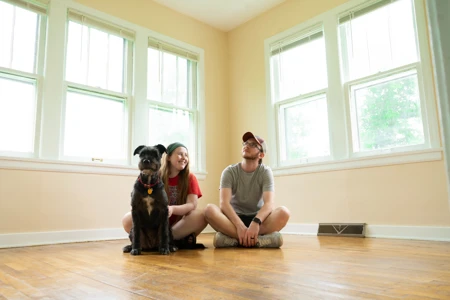Please note that the Shared Ownership scheme is an English scheme only. The scheme is not available in Scotland or Wales, and rules differ in Northern Ireland.
If you don’t think you can afford a mortgage but you’re still keen to get on the property ladder, the government’s Help to Buy: Shared Ownership scheme might be be the ideal solution. Put simply, the scheme lets you buy a portion of the property then pay rent on the rest.
Wait, how does that work?
Don’t worry – you’ll still be the only person in the property. The portion of your home that you don’t have a mortgage for will be owned by the local housing association, which rents it out to you.
It’s up to you (within a range) what percentage of the property you take out a mortgage for, and which percentage you rent. If your financial circumstances later improve and you want to increase the percentage of the property you own (‘staircasing’), you can usually do that – sometimes all the way up to 100%.
Who can get a Shared Ownership home?
Not everyone is eligible to take part in the scheme, as it’s designed to help buyers who might struggle to get on the property ladder otherwise. You can take advantage of the scheme if:
- The property is a new-build home, or an existing home that’s already on the Shared Ownership scheme and is being resold by the part-owner and the housing association.
- You (combined with whoever you’re buying with) earn no more than £80,000 a year – or £90,000 in London.
- You can’t afford to buy a suitable home without the scheme.
Most people who use the scheme are first time buyers, but you don’t have to be. If you already own a home but are already in the process of selling it, you could also be eligible.
Shared Ownership can be a lifeline for buyers who need it, but remember, it’s not as easy as rocking up and choosing a home. You still need to go through the usual home-buying process, which includes budgeting and saving for a deposit and getting a mortgage for the part of the property you own. A good credit rating, a sensible deposit, and enough money to cover the cost of moving home are all vital. Nobody can escape that!
Advantages of Shared Ownership
- Because you don’t need a mortgage for the whole property (and possibly as little as 25%) your deposit will be a lot smaller.
- As you own part of the property, you’ll still benefit if property prices rise and you decide to sell your share.
- Most housing associations will let you increase the percentage of the property that you own. Sometimes there’s a cap, but often you can go up to 100%.
- Every case is different, but usually people on Shared Ownership schemes end up paying less per month than they would if they were simply renting.
- Despite common misconceptions, most (but not all) housing associations will let you decorate your home how you want! It’s not quite like renting, where you need the landlord’s permission for everything. The only exception will be if you want to do something drastic, like adding a conservatory.
Disadvantages of Shared Ownership
- Most Shared Ownership properties are leasehold, which means you’ll have to pay communal maintenance charges.
- No matter how little of the property you own, you’re liable for everything that needs fixing, just as you would if you owned the property outright.
- If you decide to increase the amount of the property that you own, you’ll probably need to pay extra fees to make it happen.
- Some housing associations put caps on how much of the property you can own, so if you think you’ll want to increase it in the future, check the small print.
- Just like all homeowners, it’s possible to get into ‘negative equity’. That means you might lose money if you decide to sell your portion of the home, but the value of the property has gone down.
Most major lenders offer Shared Ownership mortgages. If you’re looking for the right one, chat to a mortgage broker who can help you understand the process and find you a suitable deal.
Important information
Your home may be repossessed if you do not keep up repayments on your mortgage.
There may be a fee for mortgage advice. The actual amount you pay will depend upon your circumstances. The fee is up to 1%, but a typical fee is £599.

